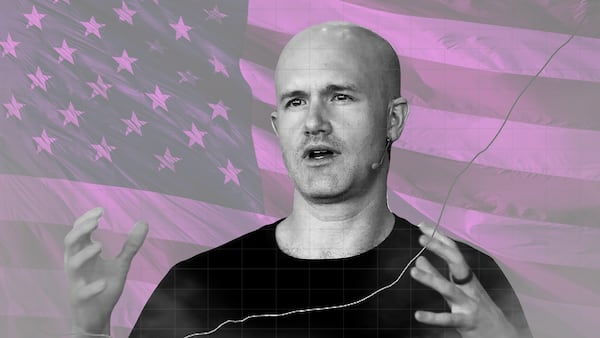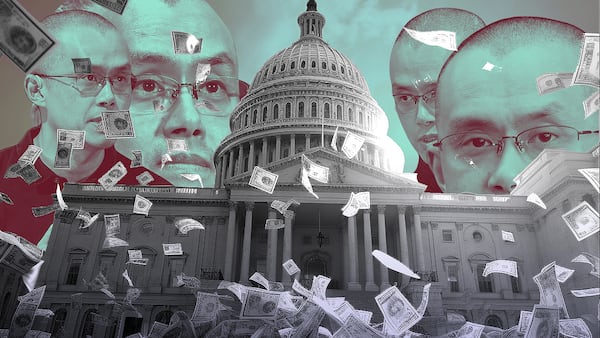- DL News obtained a memo showing the US Treasury asked the Senate to weigh stricter rules on crypto.
- The Blockchain Association is lobbying Congress to see crypto as a tool to help crackdown on terrorists like Hamas.
- Chris Perkins of CoinFund is one of many crypto leaders urging Washington to "strike the right balance."
The US Treasury asked a powerful Senate committee to strengthen federal laws designed to prevent terror organisations from using crypto exchanges to fund their operations, according to a document dated November 28 obtained by DL News.
In a four-page memorandum sent to the US Senate Banking Committee, the Treasury urged lawmakers to consider a “new type of sanction” for crypto and to close loopholes that may permit blockchain-based assets to be used in illicit finance.
The memo drew an immediate reaction from crypto policy experts.
“The ask is so insanely and profoundly overbroad, we’d be creating both a more overreaching and way jankier surveillance state than even China,” Austin Campbell, managing partner and founder of Zero Knowledge Consulting, wrote in a post on X that is being shared by key advocates, lawyers, and economists.
Crypto and crime
The proposal landed just as US crypto industry’s top lobbying group convened meetings between blockchain experts steeped in national security and staff members for 30 lawmakers on Capitol Hill.
With Hamas’ past use of cryptocurrencies casting a harsh light on the industry, crypto leaders are keen to brief policymakers on the facts around blockchain networks and illicit finance.
Thanks to the transparency and traceability of blockchain-based transactions, advocates hope that policymakers keep an open mind about crypto, and recognise that the technology can be a useful tool for law enforcement efforts.
Criminal crypto funding activity accounted for 0.24% of the total digital assets volume in 2022, according to a Chainalysis report on digital assets used in crime.
Yet the Treasury’s memorandum may complicate the crypto industry’s bid to win support in Washington.
It doesn’t help that the action this week comes after Binance, the world’s biggest crypto exchange, pleaded guilty to facilitating crypto payments for Hamas, ISIS, and Al Qaeda, and agreed to pay a $4.3 billion penalty.
Fly-in meetings
On Tuesday, the Blockchain Association arranged private “fly-in” meetings to let crypto leaders walk congressional staffers “through the many ways that crypto technology enables tracing illicit transactions along the blockchain,” Dave Grimaldi, the association’s executive vice president of government relations, told DL News in an email.
Industry representatives also showed examples of how crypto firms work together with law enforcement so help seize and freeze terrorism funding.
‘A strong economy is the number one pillar of national security.’
— Chris Perkins, CoinFund
Ever since Hamas led a surprise attack on Israel on October 7, national security officials and lawmakers on both sides of the Atlantic have turned up the heat on crypto.
The assault spurred longtime crypto critics such as Senator Elizabeth Warren, a Democrat from Massachusetts, to double down on their calls for a crackdown on the asset class.
Yet the advocates who spoke with DL News said they received a surprisingly warm reception from congressional staffers on Tuesday, especially from Democrats who often draw a harder line on crypto.
“What surprised me the most was the understanding of congressional staff of the benefits of crypto tracking,” said Nilmini Rubin, chief policy officer at Hedera, an open source blockchain protocol.
Lobbyists often meet with staff to help them prepare potential recommendations to their bosses. In this week’s meetings, the staffers understood that the fraction of illicit finance done through crypto is more traceable.
Another surprise
“People appreciated that funds were able to be seized and things are able to be tracked,” Rubin told DL News on a video call.
She was formerly a director in the White House National Security Office, as well as a staff member on the Senate Foreign Relations Committee.
Another surprise was how the Binance case and the guilty plea and resignation of its co-founder and CEO, Changpeng “CZ” Zhao, were not a big part of the conversations.
“It was kind of like it was resolved,” Rubin said. “It showed that the law does work.”
It remains to be seen whether the advocacy efforts are overshadowed by the Treasury memorandum.
“Throughout our history, our country continues to grapple with privacy versus national security based on the national security climate,” said Chris Perkins, president of asset manager CoinFund, in an interview.
Following the Hamas attack on Israel, the climate may be “back in favour of the government and away from personal freedoms,” Perkins said, hoping to “find the right balance.”
Zero tolerance
“I have zero tolerance for terrorist financing,” he said. He was a captain in the US Marine Corps and is a veteran of the Iraq War.
“I’ve been on the receiving end of anything you can imagine they’ve thrown at me, and thankfully, I’ve survived. So one single penny that goes to them is unacceptable.”
For Perkins, it’s essential to crack down on centralised exchanges violating laws.
“But let’s leave the technology out of it,” he said.
There is a lot at stake if regulators intervene with technology to a point of suppressing innovation, Perkins said. It could mean that the US will “lose the competitive battle for the new internet” if other jurisdictions become more attractive for talent.
“A strong economy is the number one pillar of national security,” Perkins said. “Without a vibrant economy that’s tech and innovation friendly, your national security is going to be compromised.”
Inbar Preiss is a Brussels-based correspondent who covers crypto regulatory policy. Have a tip? Contact the author at inbar@dlnews.com.




